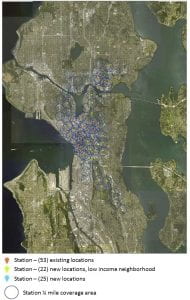November 7, 2016
Is going electric the answer?

Yanbo Ge
The Pronto bike sharing system began operating in Seattle in October 2014 with 500 bikes at 54 stations located throughout the University District and downtown area of Seattle. In 2015, the system ran into funding issues and in March 2016 was bought by the City of Seattle for $1.4 million to keep it from shutting down. Recently, Seattle officials have indicated their intention to contract with Bewegen, a Quebec-based company that is proposing an electric-assist bike fleet to run and expand the Pronto system. Bewegen proposed 100 stations with 1200 electric bikes, double what Pronto is offering now. The sample map (figure 1) shows that the bike sharing system will be expanded to locations such as Wallingford, Fremont, Queen Anne, Montlake and Rainier valley. In the U-district and downtown areas, the stations will remain as they are.

Figure 1. The bike sharing system proposed by Bewegen
I applaud the City of Seattle for embracing the innovative technology and trying something new. The higher speed in combination with the climbing ability will bring a whole new connection that does not exist currently in the mountainous Seattle, which could attract a lot of riders that do not want to commit a pedal-only system. For example, anyone could just hop on a bike downtown and cruise up to capitol hill or the University district without worrying about getting to the bus, pedaling up the hills or finding a parking lot for the car.
But I also doubt the ability of the proposed plan by Bewegen to fix Seattle’s bike sharing because it does not solve several execution problems with the old Pronto system, which appear to me as the main reasons for its failure:
- Station density and station locations. The station density now is too low, meaning the walking distance to pick up or return a bike is too long for short point-to-point rides. The Pronto system also seems to have made some bad decisions when it comes to the station placement. The stations are too far from transit facilities to realize the goal of being “first/last mile” transit, For example at important Link stations such as the University of Washington station and the West Lake station, there are no Pronto bikes available. Bewegen’s proposed system does not solve these problems.
- Pricing. Pronto charges $8 for a daily pass, which is pretty expensive if one only wants to take one or two short rides in a day. The annual pass is relatively cost effective if used frequently, but given the weather of Seattle, the high coverage of bus system and the low accessibility of the stations, I doubt that a lot of customers will choose to commit a year of usage.
- Convenience. Another thing that makes Pronto hard to use is its rule of charging a usage fee for a ride more than 30 minutes. Every 30 minutes a rider has to go to a Pronto station to restart a trip (45 minutes for those with annual passes), or must pay an extra charge on top of their daily or annual pass.
Instead of switching gear to an electric bike fleet right away, these problems need to be solved first. If the new system proposed by Bewegen does not address them, it is hard to imagine that it will be a success.
Besides these, the city needs to consider the possible repercussions of bringing in a group of high-speed electric bikes, such as safety problems. In Shanghai China, electric bikes have become more and more of a safety hazard. There might also be other adoption barriers of these electric bikes that will stay in the way of the popularizing the e-bike sharing system, such as higher pricing (because of the higher maintenance cost) and users’ learning curve of riding an e-bike.
Recent Comments